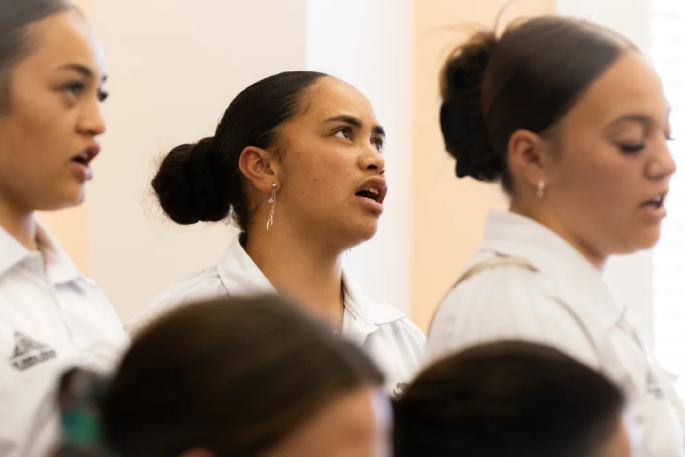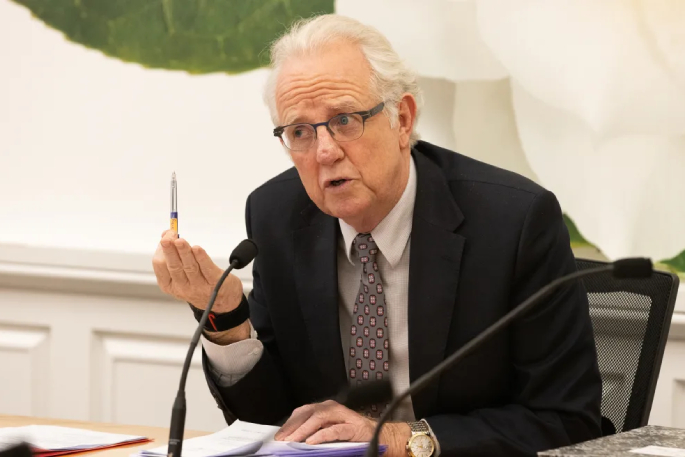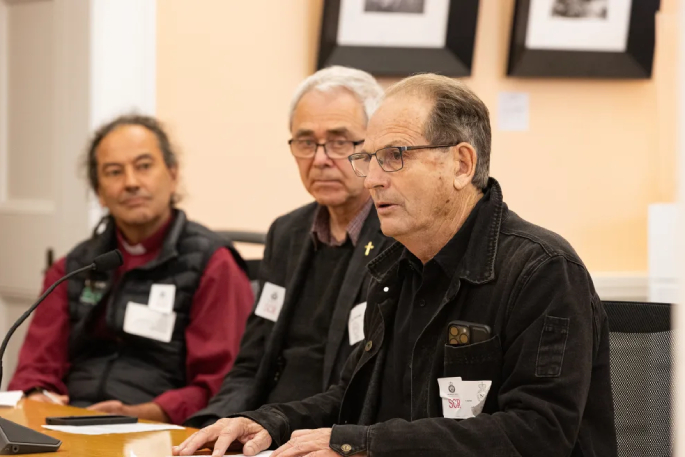Parliament's petitions committee hears many requests, but not many ask to edit part of the constitution.
This last week MPs heard from Tauranga's Alistair Reese, along with some heavyweight supporters, about a petition that would do exactly that.
It came with something of a history lesson on the negotiations that occurred at Waitangi prior to its signing, particularly regarding an oral undertaking by Governor William Hobson - often called the '4th Article' of the Treaty of Waitangi.
If you are familiar with the Treaty, you'll know the text includes a preamble and three articles. The so-called fourth article was the result of a question put to Governor Hobson (who was negotiating the Treaty of Waitangi on behalf of the Crown) by Bishop Pompallier, a Catholic leader who was concerned that Catholicism might get short shrift in an English colonial New Zealand.
As Reese tells the story, Pompallier "asked whether the natives who joined the Catholic Church would be looked after by the Crown. And that sent Henry Williams, the [Methodist] translator, mediator of the Treaty, and Governor Hobson into a bit of a huddle".
Hobson is reported to have responded "Oh, most certainly". And that if Pompallier had asked him this earlier, his "desire should have been embodied in the Treaty".
William Colenso wrote out an undertaking in te reo Māori and English that was read out to the assembled rangatira:
"E mea ana te Kawana, ko nga whakapono katoa, o Ingarani, o nga Weteriana, o Roma me te ritenga Maori hoki, e tiakina ngatahitia e ia." (The Governor says the several faiths of England, of the Wesleyans, of Rome, and also the Māori custom, shall alike be protected by him.)
 Members of a Tauranga kura sing in support of a petitioner to Parliament. Photo: VNP / Phil Smith
Members of a Tauranga kura sing in support of a petitioner to Parliament. Photo: VNP / Phil Smith
Reese originally made this petition, along with two kaumātua who have since died - Patrick Nicholas (Pirirakau, Ngāti Hangarau) and Hukikakahu Kawe (Ngāi Te Ahi, Ngāi Tamarāwaho, Ngāi Te Rangi).
The three argued that for the Māori who signed the Treaty it was an oral undertaking. (It was not read by them, but read out to them.) Further, they point out that an oral contract is equally binding. Therefore this other undertaking, which was also read to them, should have equal status and should be included within our understanding of the Treaty.
"They heard the Treaty, the preamble, articles one, two and three," says Reese. "They didn't read it. They heard it, and then they heard this, and they responded with their tohu or their signatures as a response of what they heard."
Freedom of religion
The New Zealand Bill of Rights is an aspect of New Zealand's patchwork constitution (along with the Treaty of Waitangi).
The Bill of Rights already includes a specific right for the freedom of religion. It states: "Everyone has the right to freedom of thought, conscience, religion, and belief, including the right to adopt and to hold opinions without interference."
It then gets more specific later on: "Every person has the right to manifest that person's religion or belief in worship, observance, practice, or teaching, either individually or in community with others, and either in public or in private."
So why does Reese want this same right added to the Treaty?
"My response to that is that's a secondary issue ... We actually haven't understood in fullness what the application or the repercussions of acknowledging this will be. This is a matter of integrity, of laying the moral foundation for the nation and then all our experts, laws, lawyers, theologians, academics and iwi Māori can all gather around and say, 'Ah, this actually has an impact upon the very identity of who we are as a people'.
"So I think that there's a lot to talk about, and we shouldn't be short circuited because someone's said, 'Oh, that's already taken care of'. No, let's let things fall where they fall, and let the future generations continue to discuss, as it evolves, what the meaning of that article has in the times in which they live."
 Chairing the Petitions Committee, Labour MP Greg O'Connor asks a question of Alistair Reese. O'Connor credited his Catholic background for being able to discuss some of the finer points of Pompallier's actions. Photo: VNP / Phil Smith.
Chairing the Petitions Committee, Labour MP Greg O'Connor asks a question of Alistair Reese. O'Connor credited his Catholic background for being able to discuss some of the finer points of Pompallier's actions. Photo: VNP / Phil Smith.
Perfect timing or awful timing?
Reese says his hopes for this project "oscillate between optimism and pessimism, but as we proposed to the committee today, it's timely".
Timely because it is being discussed at the same time as the ACT Party's Treaty Principles Bill, which, controversially, seeks to legislatively impose specific meanings on all aspects of Te Tiriti o Waitangi.
"It's my hope that this will enter into the discussions that have been had around the other parts of the Treaty, and that ultimately the Crown, or the government of the day, will show some real leadership, some visionary leadership, and actually demonstrate how the nation can inculcate the meaning and the expected applications of the Treaty within the legislation.
"There's still a lot to talk about. It's not a finished thing. Regardless of where you stand on the continuum, there's still a lot to talk about. And there's a lot of air that needs to be given to the Treaty right now. And it's an opportune moment."
The status of this oral undertaking within the treaty has been raised at Parliament before and shot down. It would likely not be prudent to bet on a positive shift in fortune now, but Reese is keen for it to remain part of the discussion.
Bringing along some heavyweights
Along with Reese's petition, Parliament received supporting evidence, including legal opinions and support from the faiths involved. Indeed he was accompanied to his committee hearing by Māori kaumātua and national leaders from the Anglican and Methodist churches, as well as a leader from a local Catholic Order. All gave their support.
And bring the submission to a conclusion, a group from a Tauranga kura completed the visit with waiata.



5 comments
Hmmm
Posted on 28-10-2024 10:02 | By Let's get real
"Everyone has the right to freedom of thought, conscience, religion, and belief, including the right to adopt and to hold opinions without interference."
Unless you attempt to express your beliefs in the public domain and they are deemed to be "hurtful" or "inappropriate" by a third party.
The world has moved on for the majority of the world population, but in the courts of NZ these archaic documents are being used more as a weapon of division and disharmony in modern times rather than their intended expectations for the betterment of a nation. Will dwelling on the normal practices of the past change the outcomes for the future..? Or are we doomed to forever look backwards and argue about intent.
The old saying of "follow the money" rings true.
The Master
Posted on 28-10-2024 12:32 | By Ian Stevenson
Looking at the TOW, you know the real one where it is signed... there are only three and have only ever been three articles agreed to and signed off. Even the Littlewood final draft that was translated by Rev Williams and his son is a perfect match/translation, even that only has three articles...
So, is this just another attempt to re-write the TOW to something desired in modern times by some? Surely in 1840 Rev Williams would have included it if it was real, important and had been agreed to by all. Clearly he did not.
I tend to agree........
Posted on 28-10-2024 15:11 | By groutby
.....with the two comments published so far, it would seem that the Treaty and associated variations such as in this article can and is made to look like almost anything certain groups want to, and unless we are able to decide on the 'principles' behind it then it will be forever interpreted in various ways which surely can only cause further disharmony.
I reckon we need to do one of two things, either decide by way of public referendum to definitively interpret the 'modern' meaning of it which at this point seems unlikely, or scrap it, which seems equally unlikely.
To continue to go back in time to look for solutions for current and future progress seems more than a little strange, so the 'status quo' seems to remain....for now....
Replace it.
Posted on 30-10-2024 12:07 | By morepork
After 200 years it is obvious the world has changed and, as Groutby noted, there is a modern industry in making it mean whatever certain groups want it to mean. The fundamental principles (Maori get the same rights and protection as everyone else, with the proviso being that if they want to sell their land, the Crown has first option) should be the basis of a new Constitutional document, based on Human Rights and designed to create a level legal playing field for ALL New Zealanders in the future. We should recognize our increasing diversity and ensure that ethnic religions and customs are preserved for everybody, PROVIDED they do no harm to the community as a whole, or restrict the rights of other parts of the population. The rights of New Zealand citizens would have preference over ANY ethnic privileges, and they would be the same for EVERYONE.
@ groutby and morepork
Posted on 31-10-2024 14:50 | By Yadick
Well said. 100% agree. It's time to call time.
Leave a Comment
You must be logged in to make a comment.